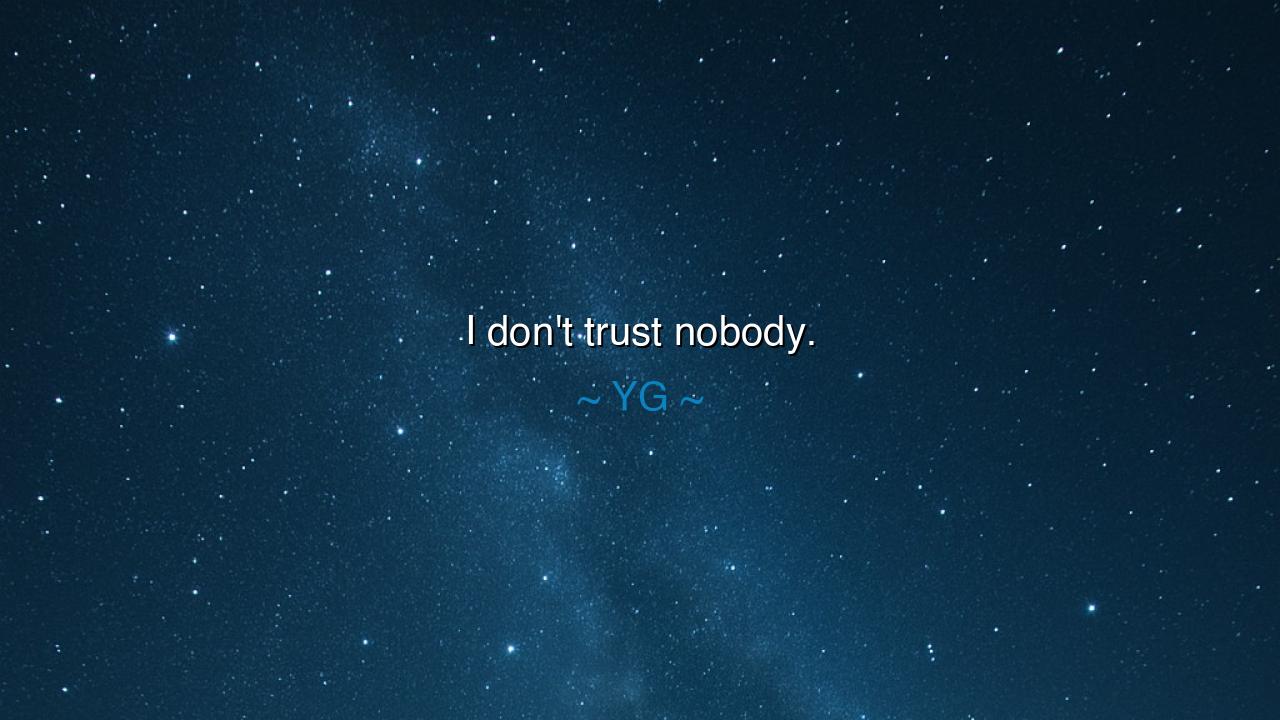
I don't trust nobody.






Hear now the stark cry of YG, the rapper whose words bear the weight of struggle and survival: “I don’t trust nobody.” At first, it sounds like the hard shield of a man against the world, but beneath its roughness lies a truth as old as mankind—that betrayal cuts deep, and that in places where loyalty is scarce, self-reliance becomes the only fortress. This saying, brief yet thunderous, speaks of a heart tested by treachery, of a soul that has seen too much to rest easy in the hands of others.
The meaning is both sorrowful and fierce. To say “I don’t trust nobody” is to confess that trust, the sacred glue of human fellowship, has been broken too many times. It is the declaration of one who has walked among false friends, who has seen loyalty bought and sold, who has felt the sting of knives in the back. Yet, it is also a vow of strength: to stand alone rather than to lean on weak or treacherous pillars. In this way, the quote speaks both of pain and of power, of loneliness and of survival.
The origin lies in YG’s own life and music, forged in the fires of Compton, where hardship, betrayal, and violence marked his path. The streets often teach that misplaced trust can be fatal, that even those who smile may harbor malice. From this soil grew his art and his philosophy. His words echo the environment from which they were born, but they also resonate universally, for betrayal is not confined to any one city or age—it is the common wound of humanity.
History offers us examples that mirror this sentiment. Think of Julius Caesar, surrounded by senators who pretended friendship while plotting his end. When Brutus, his most trusted companion, struck, Caesar’s dying cry was not of pain from the blade, but of anguish at betrayal. “Et tu, Brute?” was his own way of saying, “I cannot trust anybody.” Betrayal by those closest to us is an ancient tragedy, and it teaches why so many, like YG, build walls of iron around their hearts.
And yet, there is also danger in this creed. To trust no one is to walk always in shadow, to carry suspicion as a burden. For while betrayal destroys, so too does isolation. The warrior who never joins a brotherhood may survive, but he will never know the strength of fellowship. Thus, the quote reveals a paradox: to live without trust is to protect oneself, but also to deny oneself the deeper riches of unity, loyalty, and love. The saying is a shield, but a shield that can also become a prison.
The lesson for us is this: guard your trust wisely, but do not abandon it entirely. Betrayal is real, yet so is loyalty. Pain is real, yet so is love. To give trust foolishly is to invite ruin; to refuse trust always is to deny yourself the possibility of true companionship. Like gold refined by fire, trust must be tested, and once proven, it becomes more precious than any treasure.
Therefore, in your own life, choose carefully whom you place your faith in. Do not give your trust to the reckless, the dishonest, or the self-serving. But when you find one who is loyal, who stands with you in hardship as well as in joy, then hold fast to that bond. For life without trust is survival, but life with trust, rightly placed, is strength, joy, and legacy.
So remember YG’s cry: “I don’t trust nobody.” Hear it as both warning and wisdom. Be wary of those who would betray you, yet remain open to the rare and precious gift of loyalty. For though the world is filled with falsehood, it is also filled with brothers, sisters, and friends who will prove themselves true—if only you are wise enough to discern them. In this balance lies the path of strength and of peace.






AAdministratorAdministrator
Welcome, honored guests. Please leave a comment, we will respond soon